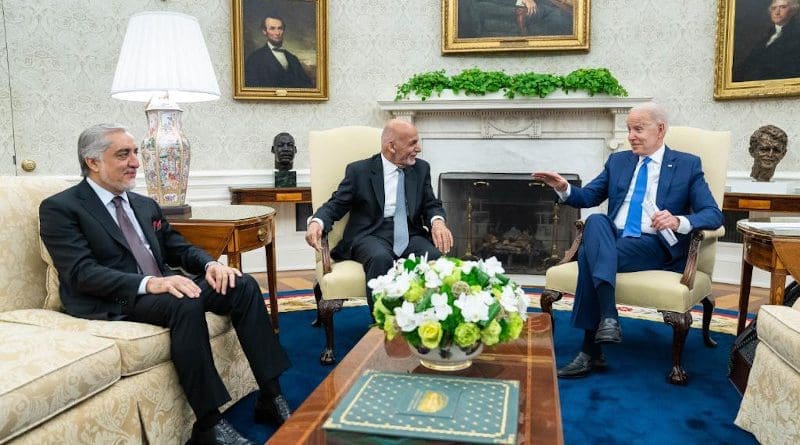US Withdrawal From Afghanistan: Uncertainties, Sober Political Realities And Formidable Challenges – Analysis
By Institute of South Asian Studies
By Imran Ahmed*
In mid-April 2021, United States (US) President Joe Biden had set 11 September 2021, the 20th anniversary of the 9/11 attacks, as the deadline for a complete withdrawal of troops from Afghanistan. However, things appear to have proceeded well ahead of schedule and Reuters most recently reported that a complete withdrawal could be just days away. Meanwhile, several North Atlantic Treaty Organization (NATO) countries, including Germany, the Netherlands, Georgia, Poland, Switzerland, Estonia, Norway, Spain and Romania have concluded their withdrawals. Smaller contingents from Portugal, the Czech Republic, Slovenia, Finland, Albania, North Macedonia and Luxembourg have also departed from Afghanistan.
Along with the physical departure of soldiers and military personnel, there has also been a sequence of handovers of important infrastructure, military installation, and strategic assets to the Afghan authorities. In late June 2021, NATO transferred air traffic control of the Balkh Airport to the Afghan Civil Aviation Authority. The US has also withdrawn from Bagram Airfield, a major symbol and cornerstone of its military power in Afghanistan. Simultaneously, Italian forces have also handed over control of Herat’s airport to the Afghanistan National Defense and Security Forces and completed their withdrawal from Afghanistan.
The US withdrawal, however, leaves unfinished business and numerous questions in the open. And the challenges ahead for Afghanistan appear gargantuan. A protracted civil war appears as the preeminent concern as fighting between Afghan forces and the Taliban continue to escalate. Deborah Lyons, the United Nations (UN) Special Envoy on Afghanistan, informed the UN Security Council that the Taliban have captured 50 out of the 370 districts in the country. Most of these captured districts surround provincial capitals suggesting that the Taliban’s military designs are oriented towards seizing capital cities once foreign troops are fully withdrawn.
There are growing anxieties concerning the Afghan government’s capacity to respond effectively to this challenge. Indeed, these concerns are shared within Washington. A recent US intelligence assessment maintained that the Afghan government could collapse within six months following the US departure. At a Senate Appropriations Committee hearing, General Mark Milley acknowledged that the collapse of the government or the dissolution of the Afghan security forces is a genuine possibility. High ranking Afghan officials, however, dismiss these assertions. Abdullah Abdullah, the head of the High Council for National Reconciliation, argued that “It is impossible for the Taliban to take over Afghanistan through war”.
However, experts have noted that the Afghan security forces’ reliance on foreign funds and contractors, their low morale and poor equipment, and vulnerability to corruption render them a sub-optimal fighting force – something that is further confirmed by the government’s call for civilian volunteers to take up arms against the Taliban. Militarising the general population could have profound long-term consequences. While the US has committed to supporting the Afghan army, it is unclear just how, and to what extent, it will maintain a military presence in the region to support the government in its fight against the Taliban. Pakistan, for now, has rejected the possibility of hosting US bases. Cross-border missions by the Central Intelligence Agency into Afghanistan from bases in Pakistan have also been dismissed.
Moreover, an ongoing problem in Afghanistan has been political fragmentation. The Taliban have capitalised on the fissures and divisions within the Afghan political elite. The High Council for National Reconciliation was set up in 2020 to present a unified front in peace negotiations with the Taliban. The Taliban have sought instead to offer direct talks with Afghan politicians in order to further divide alliances and create discord. Prime Minister Ashraf Ghani’s leadership has also become increasingly contested, particularly along ethnic lines. His recent efforts to appoint a provincial governor in Faryab were met with protests. Ghani’s paternalistic approach to governance has been a point of contention.
Abdullah Abdullah’s most recent comments suggest that the government is banking on pushing the Taliban back to the negotiating table. However, to do so requires building political consensus, maintaining unity and taking an effective fight to the Taliban. As war approaches the gates of Kabul, the future of Afghanistan looks increasingly uncertain.
*About the author: Dr Imran Ahmed is a Visiting Research Fellow at the Institute of South Asian Studies (ISAS), an autonomous research institute at the National University of Singapore (NUS). He can be contacted at [email protected]. The author bears full responsibility for the facts cited and opinions expressed in this paper.
Source: This article was published by ISAS

